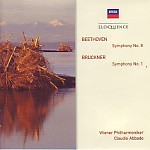You can almost always count on the Vienna Philharmonic to deliver excellent Bruckner, and this performance of the First Symphony is no exception. Abbado chooses the Linz version and leads a fresh and lively interpretation, particularly in the first movement. This is such an odd symphony, in that it doesn’t offer much opportunity for the conductor to personalize his conception in any notable way. About the only thing you can do to wreck it is to play it too slowly, which never happens here, and the rest basically takes care of itself.
The same cannot be said for Beethoven’s Eighth, which gets a performance that my colleague Christophe Huss would call “correct”: well played, and musicianly, but not particularly memorable. At no point do you have the sense that the orchestra couldn’t do just as well with no conductor at all. Granted, the opening of the finale has a lovely lightness of string articulation, but the first movement sounds a bit thick and heavy, while the delicious Allegretto scherzando loses some of its naïve wit as a result of Abbado’s fussiness with dynamics–an incipient problem here, but one that later would become a mannerism. Still, for the Bruckner, this disc earns an easy recommendation.
































